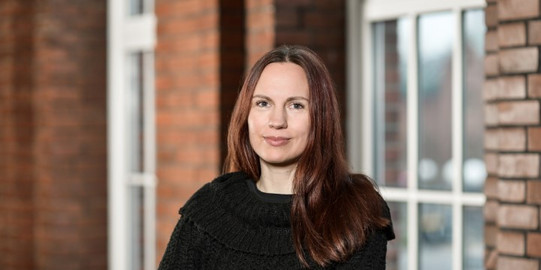Labour policy and health
This research area uses a sociological perspective to examine the conditions under which health emerges and the processes by which it is produced and preserved at the individual, social and organisational level. Based on the interactions between work and health, this directs attention to company and inter-company backgrounds, concepts and implementation conditions of preventive work design as well as occupational health and safety. Labour policy is a central field in the future framework of more limited, more flexible and more subjectivised work, and is the key to mastering the challenges of changes in the world of work and making them usable for an employment-appropriate work design.
We understand health as a state of comprehensive well-being resulting from the dynamic confrontation between social, biological and physical environmental influences and one’s own defence mechanisms and life plans (according to Rimann, Udris 1998, p. 352). At the same time, what is seen as ‘healthy’ in our society is (also) to be understood as a social construct. The activity, communication, identity and social recognition made possible by gainful employment offer health-promoting potential as well as risks of physical and psychosocial stress for individuals. If there is no balance, health-related problems and illnesses can result. The health opportunities and risks of gainful employment have an impact on areas of life outside the work sphere and vice versa. With changes in work and society, the conditions for the emergence, production and preservation of health are changing (also culturally). The aim of our research is to contribute to equal health opportunities by focusing on particularly vulnerable groups. The central question is how health can be attained and maintained in work and through work.
When researching work, the focus is on paid employment. In addition, non-remunerated forms such as voluntary work, qualification periods and reproductive labour are also included in the considerations. This broad perspective ensures that the interlocking of demands on working subjects from the life and labour worlds and the position of labour in the life course can be taken into account. Work, in any form, can only unfold its salutogenic, identity-giving and meaning-giving function if stressful factors and resources are at least in balance and the autonomy of employees is preserved. The context for research in this area is changes in the world of work and society. Phases of change deserve special attention. These are usually economically driven and open-ended from the point of view of employment-appropriate labour design. Our starting point is that change fundamentally creates opportunities, but also necessities. Currently, massive changes are taking place in the world of labour and society as a result of progressive digitalisation, the design of which requires conceptual and empirical foundations.
Labour policy forms the central framework for negotiation processes at the societal, institutional and company level for the (humane) shaping of change in work. These processes are always inevitably linked to health and illness as an expression of social representations at the societal and workplace level. In this context, labour policy encompasses, on the one hand, the level of direct participation of dependent employees and works councils in organisational contexts. On the other hand, it refers to the development processes for the institutionalised regulation of work and their implementation of such regulation in the face of tensions between work and capital.
Within the framework of the research, the actor perspective is of great importance, both in its essential function for a comprehensive penetration of the subject matter and as a starting point for concepts of change and empowerment. The thematic work builds strongly on the concept of salutogenesis (Antonovsky 1987), which opens the view to the resource perspective and the social production processes of health and safety in everyday work, and helps to open up possibilities for supporting the success of those processes through organisational and institutional measures.
The aim of research efforts in this field is to transfer theoretical and empirical knowledge into applicable concepts and measures, as well as to make knowledge from company and inter-company practice accessible for scientific discourse. The recognition of the expert role of employees/stakeholders and their inclusion in the development of the contents are essential foundations for our research work at national and international level. Our research is predominantly empirical and uses both qualitative and quantitative methods, which are combined as method triangulation depending on the object of research.
Against this background, the work of the Labour Policy and Health research field can be outlined in the following thematic fields, which we are working on or intend to develop further in the future.
- Preventive work design and health promotion for employees in times of change
- Labour policy as a framework for co-determination and design processes of labour at the societal and company level.
- Concepts and fields of (labour market) integration
Central questions for the research area include:
- How can subjective health be attained, maintained and promoted in and through work?
- How can work in times of change be designed in such a way that salutogenic factors take effect, especially with regard to increasing psychosocial stress?
- How can concepts of humane work design be implemented at company and supra-company level?
- How can the meaningful elements of work be made accessible to groups of people who are far from the labour market?
2024 - 2025 SUNMENTORS „Support for University Student Mental Health – Training for Teaching Staff“
2020-2022 ViSAS – Virtual Social Art Stage
2019-2024 GUIDE – Promoting health for permanent employment
2019-2021 ARTE – The Art of Employability
2018-2021 Athene 4.0 – Person-centred digitalisation to secure the future of the skilled trades sector
2018-2019 Succession planning and transition design in works councils
2017-2019 JobAct Europe – Social Inclusion through Social Art
2015-2019 Prevention 4.0 – Fields of action and guidelines for preventive work design in the digital working world 4.0
Coordination:
Research associates:
Student and research assistants:
In-depth texts
Recent health research has concentrated on analysing not only the reduction of pathogenic factors (in the world of labour by reducing or minimising real or suspected health hazards within the risk assessment framework according to the German Occupational Health and Safety Act), but also the promotion of salutogenic factors that increase well-being. Work design that is appropriate for employees means the creation of task-appropriate, optimal interaction between working people, equipment and work objects. Work design as a goal of company and inter-company efforts in occupational safety, health promotion and prevention goes beyond the goal of freedom from damage and impairment. The approach aims at organising and designing work in a way that is conducive to health and learning, that is non-discriminatory, participation-oriented and resource-friendly, and that takes up salutogenic approaches and maintains and promotes room for manoeuvre. This requires concepts and operational implementation strategies. Against this backdrop, the main questions pursued in this area are where in today’s world of work the levers for humane work design are located, which measures are suitable, and how these can be implemented at company or inter-company level.
Research fields therefore include the entirety of health policy strategies and measures that aim to combat potentially pathogenic influences, prevent illnesses and health impairments or their aggravation, or strengthen people’s health resources and potentials. This includes looking at health burdens and their socially unequal distribution. A number of projects in the field have analysed how different target groups’ health resources (participation, competence building, gratification, conflict management) can be included conceptually and practically and how they can be promoted within the work setting.
Special attention is paid to the situation of small and medium-sized enterprises. The guiding hypothesis of the study is that in the world of labour, in small companies there is a specific set of social conditions for the creation of safety and health. What is needed are integrative solutions that are suitable for everyday use, that can be embedded in the labour and business processes of small companies with little effort, but at the same time reliably comply with the applicable standards. Therefore the core of the empirical analysis and practical implementation proposals in a number of research projects in this field was and is the joint development of prevention concepts with employees, entrepreneurs and institutions active in the small business working environment – such as chambers, guilds and employers’ liability insurance associations.
Particularly in situations of upheaval, it is essential to design work with foresight. New technologies, processes and methods of instruction create new risks for workers and require a reorientation of concepts and methods. We therefore see in the change of work a necessity for its development and implementation in the changed work organisational processes.
In the “INDIGHO” project, concepts and measures were developed for securing skilled workers and innovative capacity in the hospitality industry.
Comprehensive recommendations for the preventive design of Work 4.0 for SMEs were set out, for example, in the “Prevention 4.0” project as part of “Implementation aids Work 4.0”.
In the “Athene 4.0” project, concepts for work design that is conducive to learning and appropriate to health are being developed for digitalisation in the skilled trades sector in the context of the introduction of a service platform.
The increasing tendencies of dissolution of boundaries and de-institutionalisation make labour policy at the same time social policy. While the world of work and the world of life are becoming increasingly intertwined, the institutions of labour are in danger of losing their grip on their subject matter. Works councils and supervisory boards, trade unions and employers’ associations as well as chambers and federations are challenged to redefine their roles. Work in transition as a research subject also raises the question of direct participation opportunities for employees, also in the context of tapping the potential of new technologies for co-determination 4.0 (see Georg et al. 2020). For example, projects in the research area are concerned with new participation approaches based on decentralised and networked reorganisation of work processes in the digital transformation, and a design of institutionalised co-determination related to this. As central actors in workplace co‑determination, interest groups play an important role both as the object of research and as transfer partners. In projects, the possibilities of enforcement within a framework of conflict partnership as well as internal structures of works council committees and internal negotiation processes are researched and supported. The research area supports interest representation bodies in practising conflict partnership at eye level by providing scientific expertise and jointly developing problem solutions in the form of projects; and it participates in trade union debates on labour policy and work intensification.
In the project “Preventive work organisation using sections 90 and 91 of the Works Council Constitution Act (BetrVG)”, the legal basis of works council action was investigated from the point of view of (timely) participation in corporate decision-making and the development of reliable labour science findings for employee-friendly work design.
In the “Prevention 4.0” project, the focus was on ways of shaping digital transformation through interest representation in a way that is appropriate for employees.
The project “Succession Planning and Transitional Arrangements in the Works Council” examines processes of action in transitional processes when there is a change of chairmanship within the works council body.
The “CAUSA-A” project examined issues related to safe and healthy working under the influence of the COVID-19 pandemic, both inside and outside the workplace.
Unevenly distributed biographical opportunities create structural disadvantages for entire groups of people, whose integration into the labour market and society is a central challenge for labour policy. Disadvantaging characteristics can be socio-economic, health and educational inequalities. Stigmas by outsiders and low self-efficacy expectations due to experiences of failure on the part of the target group often reinforce each other. In order to overcome these mechanisms, approaches are needed that support the target groups in recognising their potential, developing it, and ultimately changing their external image. Therefore, our research focuses particularly on strength-oriented approaches that support the empowerment of individuals. In practice, some promising approaches exist whose visibility is limited by various diffusion barriers. The research area therefore sees its task as being primarily to strengthen the diffusion potential of successful methods through scientific monitoring, evaluation and further development, and preparation of the approaches for scientific discourse and further transfer to practice.
Target group specific approaches are particularly promising. After a first step of stabilising the target group, these combine the development of necessary competencies with positive experiences to strengthen the group’s own self-efficacy expectations. One research strand pursued here is the approach of Social Art as an educational principle. This is based on personality strengthening and has high success rates in the labour market integration of people with multiple placement barriers. Here, in European projects, we support the transnational development of the method for country-specific problem situations.
In the “GUIDE” project – Supporting Health in Sustainable Employment, the focus is on the (re)production process of health in people in long-term unemployment, and the potential to activate individual health prevention in connection with meaningful (gainful) employment. In the “JobAct Europe” project, the further development and preparation of Social Art approaches is being pursued as an educational principle for transnational problems in the empowerment of vulnerable target groups.
The “ArtE” project focuses on strengthening an “entrepreneurial mindset” in connection with theatre methods to combat youth unemployment in the Mediterranean region.
In the “ViSAS” project, the goal is to transfer social-artistic youth work into the digital space on a European level, in order to make youth work in Europe sustainable and innovative.




![[Translate to English:] [Translate to English:]](/storages/zentraler_bilderpool/_processed_/a/f/csm_Kontakt_b86e8d8ecc.png)
![[Translate to English:] [Translate to English:]](/storages/sfs-sowi/_processed_/6/c/csm_Glasfront_sfs_Header_eae6d325d3.jpg)





